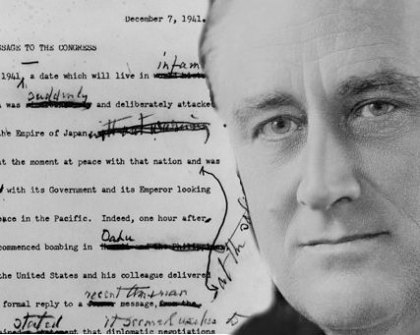
But this is not about President Barack Obama, whose Dec. 6 address sought to calm the public in the wake of domestic terrorism in California. It is about President Franklin D. Roosevelt and the Dec. 7, 1941, attack by Japanese naval and air forces at Naval Station Pearl Harbor.
Just after the attack, which left 2,403 dead, everyone around the president was rattled, but Eleanor Roosevelt described her husband as "completely calm. His reaction to any event was always to be calm. If it was something that was bad, he just became almost like an iceberg, and there was never the slightest emotion that was allowed to show." (Found in No Ordinary Time, --1994; Simon & Schuster -- by presidential historian Doris Kearns Goodwin.)
One day later, Roosevelt addressed Congress to ask for a declaration of war and to reassure the American public of the country's "unbounded determination."
Roosevelt edited his speech, striking through phrases and reworking sentences. He rewrote the first line, changing, "a date which will live in world history" to the much stronger, "a date which will live in infamy."
There were other strong segments. At one point, Roosevelt spoke of the "righteous might" of Americans. At another, he said there was "no blinking at the fact that our people, our territory and our interests are in grave danger."
The final product, delivered the next day, was a brutally honest and unabashedly muscular piece of political rhetoric. Here is the text:
Yesterday, December 7, 1941 - a date which will live in infamy - the United States of America was suddenly and deliberately attacked by naval and air forces of the Empire of Japan.
The United States was at peace with that nation and, at the solicitation of Japan, was still in conversation with its government and its emperor looking toward the maintenance of peace in the Pacific. Indeed, one hour after Japanese air squadrons had commenced bombing in the American island of Oahu, the Japanese ambassador to the United States and his colleague delivered to our secretary of state a formal reply to a recent American message. While this reply stated that it seemed useless to continue the existing diplomatic negotiations, it contained no threat or hint of war or of armed attack.
It will be recorded that the distance of Hawaii from Japan makes it obvious that the attack was deliberately planned many days or even weeks ago. During the intervening time the Japanese government has deliberately sought to deceive the United States by false statements and expressions of hope for continued peace.
The attack yesterday on the Hawaiian Islands has caused severe damage to American naval and military forces. I regret to tell you that very many American lives have been lost. In addition American ships have been reported torpedoed on the high seas between San Francisco and Honolulu.
Yesterday the Japanese government also launched an attack against Malaya. Last night Japanese forces attacked Hong Kong. Last night Japanese forces attacked Guam. Last night Japanese forces attacked the Philippine Islands. Last night the Japanese attacked Wake Island. And this morning the Japanese attacked Midway Island.
Japan has, therefore, undertaken a surprise offensive extending throughout the Pacific area. The facts of yesterday and today speak for themselves. The people of the United States have already formed their opinions and well understand the implications to the very life and safety of our nation.
As commander-in-chief of the Army and Navy, I have directed that all measures be taken for our defense. But always will our whole nation remember the character of the onslaught against us. No matter how long it may take us to overcome this premeditated invasion, the American people in their righteous might will win through to absolute victory.
I believe I interpret the will of the Congress and of the people when I assert that we will not only defend ourselves to the uttermost, but will make very certain that this form of treachery shall never again endanger us.
Hostilities exist. There is no blinking at the fact that our people, our territory and our interests are in grave danger.
With confidence in our armed forces - with the unbounded determination of our people - we will gain the inevitable triumph - so help us God.
I ask that the Congress declare that since the unprovoked and dastardly attack by Japan on Sunday, December seventh, 1941, a state of war has existed between the United States and the Japanese Empire.
Related:
Folklore shrouds writing of the Gettysburg Address
If you would like to comment, give us a shout, or like us on Facebook and tell us what you think.